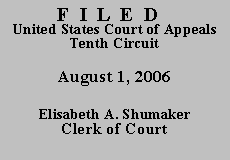

v.
DISTRICT ATTORNEY,
ARAPAHOE COUNTY; KEN
SALAZAR, Attorney General of the
State of Colorado
ON APPEAL IN FORMA PAUPERIS,
DENYING CERTIFICATE OF APPEALABILITY,
AND DISMISSING APPLICATION
Before HENRY, BRISCOE, and O'BRIEN,
Circuit Judges.
KEVIN L. McKINNEY,
Kevin L. McKinney, a state prisoner proceeding pro se,(*) seeks a certificate of appealability (COA) to allow him to appeal from the district court's order denying his habeas corpus petition under 28 U.S.C. § 2254. See 28 U.S.C. § 2253(c)(1)(A). Because we conclude McKinney has failed to make "a substantial showing of the denial of a constitutional right," we deny his request for a COA and dismiss his application. 28 U.S.C. § 2253(c)(2).
McKinney was convicted following a jury trial of multiple counts stemming from a 1999 armed robbery of a grocery store in Arapahoe County, Colorado.(2) He was sentenced to 216 years imprisonment. The Colorado Court of Appeals affirmed his conviction and the Colorado Supreme Court denied certiorari. McKinney then filed a habeas corpus petition in the United States District Court for the District of Colorado, alleging a due process violation because he was convicted on evidence seized as the result of an illegal vehicle stop. The district court referred the matter to a magistrate judge, who recommended the petition be denied because McKinney had a full and fair opportunity to litigate his claim in state court, and as a result, the court was precluded from considering the matter. After reviewing McKinney's objections, the district court adopted the magistrate judge's recommendation and denied the petition. The district court also denied McKinney's application for a COA and his motion to proceed in forma pauperis.
A COA is a jurisdictional pre-requisite to our review. Miller-El v. Cockrell, 537 U.S. 322, 336 (2003). This court can issue a COA "only if the applicant has made a substantial showing of the denial of a constitutional right." 28 U.S.C. § 2253(c)(2). Where, as here, the district court has rejected the constitutional claims on the merits, "[t]he petitioner must demonstrate that reasonable jurists would find the district court's assessment of the constitutional claims debatable or wrong." Slack v. McDaniel, 529 U.S. 473, 484 (2000).
The district court found the Supreme Court's decision in Stone v. Powell barred McKinney's claim. 428 U.S. 465 (1976). In Stone, the Court held that "where the State has provided an opportunity for full and fair litigation of a Fourth Amendment claim, the Constitution does not require that a state prisoner be granted federal habeas corpus relief on the ground that evidence obtained in an unconstitutional search or seizure was introduced at his trial." Id. at 481-82. In Gamble v. Oklahoma, we held such opportunity "includes, but is not limited to, the procedural opportunity to raise or otherwise present a Fourth Amendment claim," a full and fair evidentiary hearing and "recognition and at least colorable application of the correct Fourth Amendment constitutional standards." 583 F.2d 1161, 1165 (10th Cir. 1978).
In this case, McKinney filed a pretrial motion to suppress, raising the issue of whether there was probable cause to stop the vehicle in which he was a passenger. The trial court held an evidentiary hearing, during which several police officers testified. The trial court ruled there was probable cause to arrest McKinney and denied the suppression motion. The Colorado Court of Appeals upheld the trial court's ruling, finding "the combination of facts known to all officers involved provided a sufficient basis for the investigatory stop and subsequent arrest and search." People v. McKinney, No. 00-CA-1388, slip op. at 5 (Colo. Ct. App. Jan. 17, 2002). The record clearly demonstrates McKinney had multiple opportunities to fully and fairly litigate his Fourth Amendment claim, and the state courts applied the correct constitutional standards in ruling on the issue.
McKinney has failed to show that reasonable jurists would find the district court's assessment of his constitutional claims debatable or wrong. Accordingly, McKinney's request for a COA is DENIED and his application is DISMISSED. In addition, we agree with the district court that McKinney has not presented a reasoned, nonfrivolous argument on appeal, and thus this appeal is not taken in good faith. See 28 U.S.C. § 1915(a)(3). McKinney's motion to proceed in forma pauperis is DENIED. McKinney is directed to remit the full amount of the filing fee within twenty days.
Entered by the Court:
Terrence L. O'Brien
United States Circuit Judge
*. We construe pro se pleadings liberally. Ledbetter v. City of Topeka, Kan., 318 F.3d 1183, 1187 (10th Cir. 2003).
2. McKinney was convicted of attempted first degree murder after deliberation, conspiracy to commit attempted first degree murder after deliberation, second degree kidnaping, two counts of second degree assault, two counts of aggravated robbery, conspiracy to commit aggravated robbery and first degree assault.